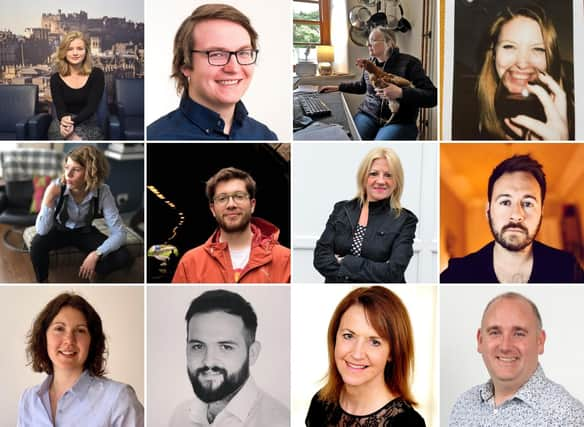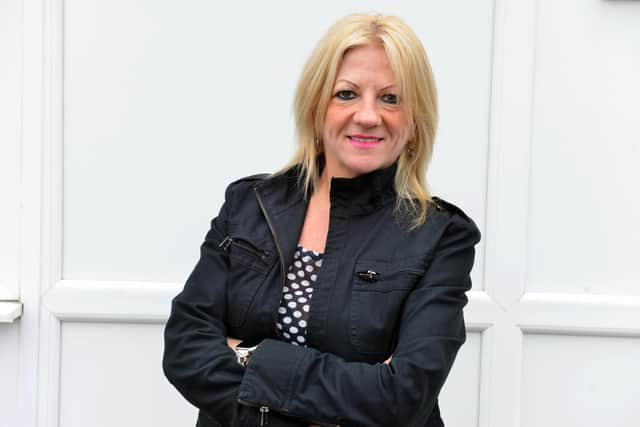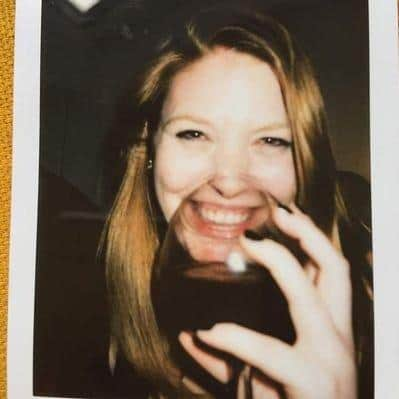Our journalists, editors, and writers reflect on a turbulent 2020


We asked our reporters, writers, and editors what work has been like for them while the pandemic raged around the world. Here are their stories.
If you value what our staff do and want unlimited access to all our stories please consider subscribing to our websites. You can sign up to The Scotsman from just £3 a month or subscribe to the Edinburgh Evening News from £1 a month. Thank you for your support.
Advertisement
Hide AdAdvertisement
Hide Ad‘We had to cover the biggest story since the Second World War without a newsroom’
Alan Young, head of content:
“The main challenge has been covering what is the biggest story since the Second World War without a physical newsroom. It would have been unfathomable a year ago but it has worked!
“Google chats have replaced conferences and in many respects communication across teams has actually improved.
“The pandemic has also forced innovation and initiatives like the award-winning Scotsman Sessions have ended up being a real highlight, as has the support of readers who have taken the time to get in touch. That has been brilliant, talking to readers and helping each other through this.


"The whole team has responded brilliantly, we look out for one another, and it feels like we are coming out of this incredible, unprecedented period in history stronger than ever. I couldn't be more proud of them.”
‘I am extremely proud of the team’
Joy Yates, interim editorial director:
“I started my new role literally days before Lockdown 1.0. I had only met with a few of my new team and then we all left the office and starting working from our kitchens, spare rooms and home offices.


“Our incredible dedicated, hard-working team put solid communication channels into operation and we proved we can work flexibly and remotely. I have missed not getting to meet all the team in Scotland and look forward to being able to do so next year.
“I am extremely proud of the team who not only worked in extreme conditions, but implemented a new way of working as we launched our Digital Acceleration editorial transformation programme.
Advertisement
Hide AdAdvertisement
Hide Ad“I look forward to our titles being at the forefront of supporting the community and businesses in Scotland as we exit lockdown restrictions.”
‘The news that was flooding in was overwhelming’
Rachel Mackie, live reporter: “Starting any job is never easy, and my first few days in the office were all about finding out where the printer is and ‘have you got your pass sorted Rachel’?
“Then, wham, four days in and I’m being told to grab a laptop because we’ll be working from home for a bit - no one knew for how long.
"Having barely met people more than once in a busy newsroom, I found myself stuck at my kitchen table, trying to learn the ropes of my new job from afar. The news that was flooding in was overwhelming.
“Now we were covering the rising death toll, strict lockdown measures - I’d covered bad news and breaking stories before, but this was relentless and terrifying.
“Looking back though, the main thing I remember, honestly, is how nice everyone was. Everybody at the paper was under extraordinary pressure to adapt, to work harder, and yet no one took it out on the others.
“There was still some humour, people took the time to ask how you were getting on, still able to make you feel like you were part of a team. I don’t think anything could make me feel prouder of the paper, or the team, than that.”
‘Hardest thing was not being able to have face to face interaction’
Jane Bradley, consumer affairs correspondent
Advertisement
Hide AdAdvertisement
Hide Ad"When lockdown hit in Scotland, I should have been in the press box for the final day of the World Figure Skating championships in Montreal, Canada, watching Scottish skaters Lewis Gibson and Natasha McKay compete.
“As well as my day job as a news and consumer journalist at The Scotsman, I also occasionally cover figure skating - and this would have been one of the highlights of my sports journalism career. As things turned out, the championships was, of course, cancelled and I was confined to my kitchen table in Edinburgh - unable to travel more than five miles from my home, nevermind halfway across the world.
“Like many families in Scotland, I spent lockdown juggling work with home schooling my daughter, then seven. Both I and my husband - who works for a health charity - were busier than ever and we were forced to come up with ever more inventive ways to manage the struggle - one of us starting work at 7am to get a couple of hours in front of the computer while the other spent time with our daughter, or passing the home schooling mantel to a grandparent, who would teach a maths lesson for an hour via Zoom.
“Possibly my biggest challenge of the past few months was interviewing a refugee family from Syria, who had lived in Scotland for a year. Due to covid restrictions, we were unable to meet face-to-face and setting up a three-way WhatsApp video call with a translator due to language problems created some practical difficulties in itself.
“However, the hardest thing was not being able to have face to face interaction with them when discussing highly emotive issues, such as their harrowing experiences during the civil war in their home country. Although a large proportion of my job is done over the phone and by email even in normal times, what the pandemic has taught me is that there is absolutely no substitute for human contact.”
‘How do you produce newspaper from kitchen tables and spare rooms?’
Allan Crow, live editor, Fife and Falkirk:“We locked the office with no idea how, or even if, it would work and a concern over whether we would even survive.
“We did, thanks to the creativity and commitment of everyone on the team who, week in, week out, produced newspapers which knocked it out of the park.
Advertisement
Hide AdAdvertisement
Hide Ad“I remain hugely proud of the Fife Free Press’ coverage throughout lockdown.
“We launched several appeals to ‘save’ local organisations and delivered every time, including £20,000 to ensure our Maggie’s Centre was able to carry on, and championed local businesses events and the community response every day.
“For 2021? There a Scottish election to get our teeth into, and there’s a job to do championing our towns’ recovery from lockdown - leading the conversation, not just reporting and reacting to it.”
‘It’s been more difficult to switch off’
Jill Buchanan, deputy head of print (Scotland):
“I've enjoyed not having a commute to work but the downside is, as well as missing interaction with colleagues, it's also been more difficult to switch off as the laptop is always looming in the corner of the room.
“Since the earliest days of lockdown we've continued to produce some amazing newspapers and great online coverage of how the pandemic has and continues to affect our communities.
“And everyone has done all this against a backdrop of home working, home schooling, social isolation and in some cases, illness. Everyone has been amazing.
“Here's hoping 2021 brings a relaxation in the strict guidelines as people are vaccinated and there can be a return to some form of normality, but I'm concerned about what the implications will be for our country with Brexit.
"But one thing is for sure, I'll be glad when the day comes that I don't have to keep a face mask in every jacket pocket.”
‘Anxiety gripped me in March and didn’t really let go’
Alex Watson, digital content editor:
Advertisement
Hide AdAdvertisement
Hide Ad“The biggest challenge has been keeping tabs on my own mental health. Partly because of my job, anxiety gripped me in March, and didn’t really let go.
“A bit like watching a devastating wave coming, my colleagues and I started to realise the impact of coronavirus before most others outside our industry. Working long hours to keep an eye on early morning live blogs and late evening press conferences didn’t help.
“When days off came, I couldn’t relax. I would rather have been working - at least I was helping, in some form. It was a recipe for burnout and, by the time my 30th rolled around in September, I think I well and truly experienced that.
“We opened a weekly, virtual pub during the first few months of lockdown. The journalists I work with got to grips with writing about coronavirus extremely quickly. Their work helped a lot of people to understand what was happening.
“I’m very much looking forward to Scotland’s live music scene coming back with full force. And to hugging my mum.”
‘Home-schooling was stressful’
David McLean, retro reporter:
“Keeping spirits up and trying not to let the relative isolation and lack of contact with family and friends get to me too much has been a constant challenge this year.
“Work-wise things have gotten easier since the schools went back. I’ve a young daughter at primary school, and the home-schooling period was a stressful time for my wife and I.
“On the plus side, I feel like I really got to ‘know’ my daughter during this time, in a way that would not have been possible working from the office and being out the house for most of the day.
Advertisement
Hide AdAdvertisement
Hide Ad"That’s not to say that WFH is without its hurdles. Self-motivation is a constant battle and I’ve had to work harder than normal at ensuring I continue to meet the usual deadlines.
“I look forward to 2021 and the opportunity to meet people in person again.
‘I got engaged during lockdown’
Patrick McPartlin, football writer:
“When Scottish football went into shutdown as a result of the pandemic, the main effect was that there was a lot less news to write about.
“I was seconded to a different part of the business for three months - not unlike a short-term loan deal in football - and felt fortunate to still have a job to do.
“On days off I was trying to get out as much as we were allowed to; cycling around Edinburgh became my escape and helped keep my fitness and mental health in check.
“I also got engaged during lockdown - if you can survive three months cooped up together etc, etc - but any wedding plans are still on hold due to travel and other restrictions.
“I think we're in a privileged position to be watching football regularly and reporting on it, but I'm really looking forward to fans returning to games. They've been sorely missed.”
‘2021 will be the most important year in Scotland’s recent history’
Conor Matchett, politics reporter:
Advertisement
Hide AdAdvertisement
Hide Ad"Getting into the headspace of work and not being able to bounce off colleagues in a normally buzzing newsroom is something I still miss, especially on the days it is tougher to get out of bed.
"The newsroom is an ecosystem, it's difficult to reproduce at home (but the extra hour of sleep is appreciated).
"Breaking the news Higher exams were cancelled in Scotland is my highlight, but the continued coverage of the machinations of Holyrood by the politics team has been excellent.
"It would not be an overstatement to say 2021 is the most important year in Scotland's recent history. The Holyrood elections will set the tone for government and for the independence movement for the next five years, and will be gripping.”
‘It’s been tough at times to keep going’
Elsa Maishman, health correspondent:
“Oddly the thing I miss most is one a lot of people have been glad to leave behind - the commute. I used to walk for an hour and a half each day through the beautiful streets of Edinburgh to get to and from the Scotsman offices. I’d get through a new audiobook every week!
“It’s been tough at times to keep going through the crisis - especially given how much of a hit the journalism industry has taken.
"Taking on the role of health correspondent in a pandemic was quite a challenge, but it’s been a brilliant opportunity. 2021 is also going to be a really important year for health coverage, Covid-19 isn’t going anywhere just yet, and there are a lot of other knock on effects which are at some point going to come to the surface.”
‘We have played our small part’
Euan McGrory, editor (print) Scotland:
“The first thing that hits me looking back on all these months of producing our newspapers from our kitchen tables and spare rooms is a sense of loneliness.
Advertisement
Hide AdAdvertisement
Hide Ad“Journalism is usually a collaborative process. We all passionately argue over which stories to cover and who to interview to really inspire and engage our readers.
“We have found new ways of doing all of this, in video calls, chat groups and even in virtual pubs where many of us sometimes gather for an after work pint.
“We have learned to live, and even thrive, outside the office, but the lack of human contact has sometimes been hard.
“My other feeling on looking back is one of pride. What we do - providing trusted news and analysis - has never been more needed.
“We can all look back with pride and say we have played our small part.”
‘How we live has been changed forever’
Joe Cawthorn, live news editor:
“The biggest challenge for me has been not being able to get back to Yorkshire to see friends and family. Technology helps, but there is no substitute for giving your mum a hug.
“I'm proud of the way we have got through this, together. We spend a lot of our waking life with our colleagues and, without the help and support of lots of people around me, I think the situation would have felt much worse.
"The way reporters shifted to remote working while covering a global pandemic, when the hunger for news was at an all time high back at the start of the year was great to see. We have a dynamic, creative and adaptable team of which I'm proud to be a part of.
Advertisement
Hide AdAdvertisement
Hide Ad“Like many, I miss a drink at the pub after work, or a meal out with my partner some weekends. I also miss the buzz of the newsroom when a big story breaks.
"I think how we live in general has been changed forever, the coming months and years will be intriguing to chart.”
‘Work has been constantly relentless and unpredictable’
Brian Ferguson, arts correspondent:
“If a time traveller had told me in mid-March – when the pandemic became an almost instant nightmare for Scottish culture – that virtually every event in 2020 would be wiped out, and the vast majority of our cultural venues would still be closed in December, it would have been unfathomable.
“But despite only a handful of jobs outside the house since those dark days, my working life has somehow been constantly relentless and unpredictable, but never less than fascinating.
“An early firestorm of closures and cancellations of venues and events were followed by campaigns for